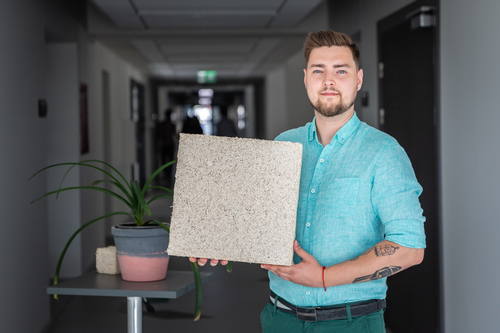THURSDAY, OCTOBER 27, 2022
Pauls Argalis, an industrial doctorate student from Riga Technical University’s (RTU) Faculty of Civil Engineering, has recently developed a new construction material for building insulation from timber production waste.
His research has since been published in Recycling, an international, peer-reviewed, open-access journal on the recycling and reuse of material resources, including the circular economy.
Building Material Research
According to RTU, Argalis’ research was inspired by the Baltic States-based company Cewood, which is known for its 50-year-old Latvian traditions of manufacturing wood wool panels.
“Wood wool panels are a material of natural origin that is good for the environment and friendly to human health. As we were looking for ways of making the production process even more sustainable, we considered the options to dispose our production waste, substandard grade panels or panels already removed from objects, by integrating them in another material,” said Cewood Board Member Ingars Udris.

 |
| Riga Technical University |
|
Pauls Argalis, an industrial doctorate student from Riga Technical University’s (RTU) Faculty of Civil Engineering, has recently developed a new construction material for building insulation from timber production waste. |
Since its establishment in 2015, RTU shares that the company has been rapidly developing. In addition to wood wool panels, the company also manufactures fibrolite panels. Cewood is currently building a new plant to increase its production capacity and substantially improve zero-waste production.
In basing his research on the company’s model, Argalis began researching how timber production waste could be recycled into a reusable construction material. In carrying out his studies, Argalis found that the material has good heat conducting qualities and is more environmentally friendly in building insulation than polystyrene foam.
“Waste resulting from wood wool panel production has added value because it contains fragments of wood and cement. In recycling it, we are creating an innovative binding material. By combining the binding material with wood wool, we obtain a material with heat insulation properties for filling in partition walls,” explained Argalis.
He added that the reuse of cement also reduces the amount of construction waste and its adverse environmental impact.
To test the new innovative material, Argalis and coauthors of the study, Maris Šinka and Diana Bajare constructed and insulated a garden house over the summer. The structure was outfitted with sensors that measured temperature, relative humidity and heat flow.
By tracking these variables, the team was able to keep track of the material properties and behavior in real-time and to adjust its contents and filling methods as needed.
Although the study has since been published, RTU reports that Argalis is continuing to test and develop the material in a lab, which involves continuing to gather analytics of the building’s heat flow, heat conductivity factor, density, tensile and pressure strength.
Argalis notes that these characteristics are essential to justify the use of this material in the industry.
“Cooperation with Cewood is already a second industrial doctoral student’s project at the Institute of Materials and Structures of the Faculty of Civil Engineering of RTU. We are very pleased with the productive cooperation between the industry and the university, as we address issues relevant for the industry,” concluded Šinka, a lead researcher of the Institute of Materials and Structures of the Faculty of Civil Engineering of RTU.
Tagged categories: Building materials; Cement; Colleges and Universities; Design - Commercial; Environmental Controls; Good Technical Practice; Insulation; Recycled building materials; Research; Research and development; Sustainability; timber; Wood